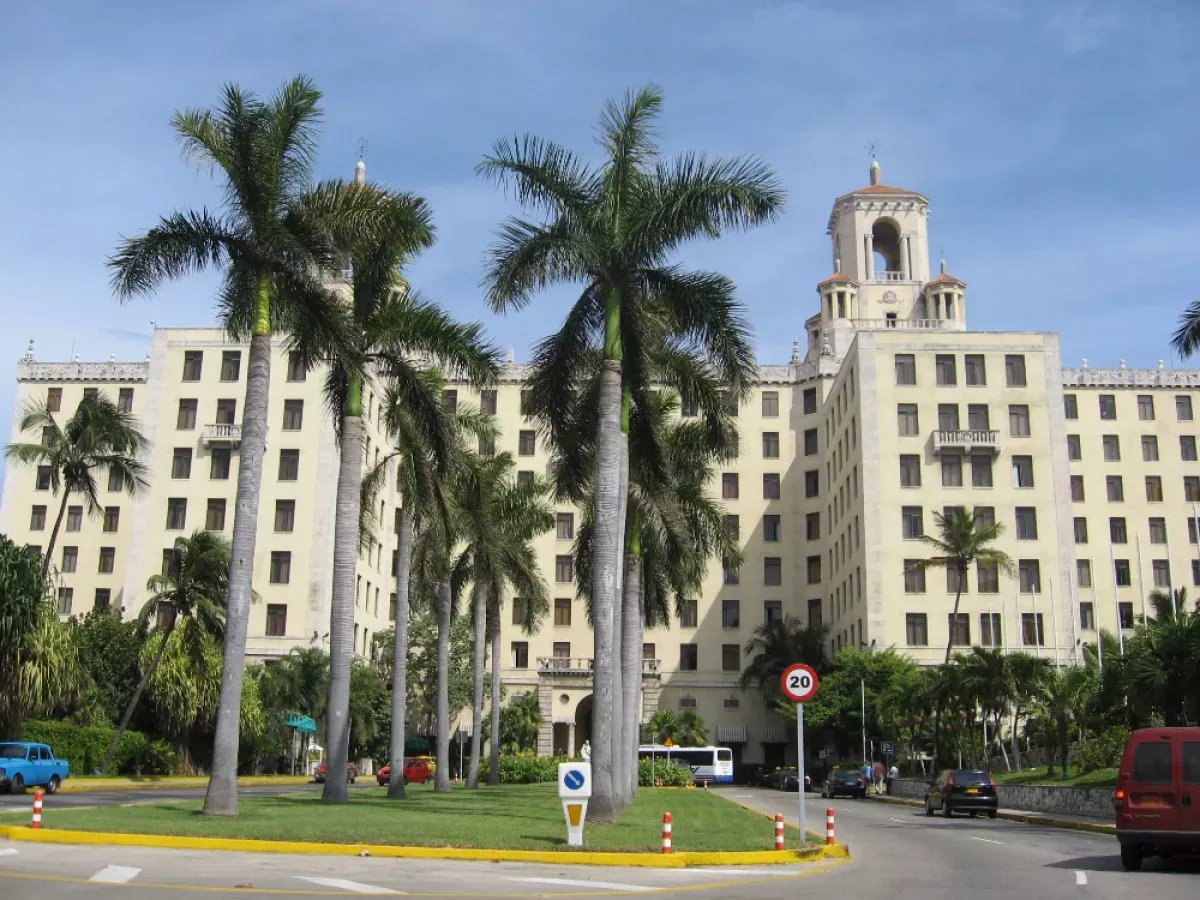Havana syndrome, or Anomalous Health Incidents (AHIs), is a disputed medical condition characterized by a sudden onset of symptoms often associated with a perceived localized sound. First reported in 2016 by U.S. and Canadian government officials and their families in overseas locations, the chronic symptoms include balance issues, dizziness, cognitive difficulties, insomnia, and headaches. The medical community does not officially recognize it as a disease.
1978: Study on Moscow Signal finds no adverse health effects
In 1978, a study found no adverse health effects from the Moscow Signal.
2014: NSA report on microwave weapon
In 2014, an NSA report stated that a hostile nation possessed a microwave weapon capable of being aimed at a person's living quarters, causing nervous system damage.
2016: Initial Reports of Anomalous Health Incidents
In 2016, U.S. and Canadian government officials and their families began reporting symptoms of Anomalous Health Incidents (AHIs) in overseas locations. Symptoms included sudden onset associated with a perceived loud sound, followed by chronic issues like balance problems, dizziness, cognitive difficulties, insomnia, and headaches.
2016: Initial Health Problems Reported in Cuba
Reports surfaced in August 2017 that American and Canadian diplomatic personnel in Cuba had experienced unusual, unexplained health problems dating back to late 2016.
August 2017: Reports of Health Problems in Cuba
In August 2017, reports surfaced that American and Canadian diplomatic personnel in Cuba had experienced unusual, unexplained health problems dating to late 2016.
August 2017: U.S. Expels Cuban Diplomats
In August 2017, the United States expelled two Cuban diplomats in retaliation for perceived Cuban responsibility for the health incidents.
September 2017: USAID Employee Report Discounted
In September 2017, a USAID employee at the U.S. embassy in Tashkent, Uzbekistan, reported an incident, but the employee's report was discounted by the U.S. State Department.
September 2017: Embassy Operates Under Ordered Departure Status
Since September 2017, the U.S. embassy in Havana had been operating under "ordered departure status", with reduced staff.
October 2017: President Trump Blames Cuba
In October 2017, President Donald Trump stated he believed Cuba was responsible for the occurrences, calling them a "very unusual attack".
2017: Cuba Denies Involvement
After the initial AHIs were made public in 2017, the Cuban foreign minister accused the U.S. of lying about the incident and denied Cuban involvement in or knowledge of the cause of the health problems the diplomats experienced.
2017: Initial Reports Indicate 26 People Affected
Around 2017, media reporting indicated approximately 26 people were affected by Anomalous Health Incidents (AHIs).
2017: Cuban scientists' cricket sounds hypothesis
In 2017, Cuban scientists hypothesized that the sounds on a recording related to Havana syndrome are that of Jamaican field crickets.
2017: U.S. State Department Investigation Begins
In 2017, the U.S. State Department concluded that the health problems were either the result of an attack or exposure to an unknown device. Speculation centered around a sonic weapon, with symptoms including hearing loss, memory loss, and nausea.
2017: US Congress asks CDC to investigate AHIs
In late 2017, the US Congress asked the Centers for Disease Control (CDC) to investigate the AHIs.
2017: Affected Canadians Still Unable to Resume Work
Several of the Canadians who were affected by AHIs in 2017 were reported to still be unable to resume their work due to the severity of their ailments.
January 2018: State Department Convenes Accountability Review Board
In January 2018, the State Department convened an accountability review board, led by retired Ambassador Peter Bodde, to review the department's handling of AHIs.
March 2018: UPenn researchers publish preliminary results in JAMA
In March 2018, UPenn researchers published preliminary results in JAMA, after examining 21 diplomats affected by Havana syndrome. The study described "a new syndrome in the diplomats that resembles persistent concussion" and concluded that "the diplomats appear to have sustained injury to widespread brain networks."
March 2018: University of Michigan Study on Ultrasound
In March 2018, a team of computer scientists at the University of Michigan reported in a study that ultrasound from malfunctioning or improperly placed Cuban surveillance equipment could have been the origin of the reported sounds.
March 2018: Canadian Diplomats Consult Neurologist, Brain Damage Observed
In March 2018, some Canadian diplomats traveled to Pittsburgh to consult with a neurologist that had previously diagnosed brain issues in US diplomats. The neurologist concluded that MRIs of the Canadians showed evidence of brain damage that was similar to what the neurologist reported for the American counterparts.
March 2018: U.S. Extends Staff Reductions at Havana Embassy
In March 2018, the U.S. State Department announced it would continue to staff its embassy in Havana at a minimum level, extending staff reductions indefinitely.
April 2018: U.S. Diplomats in China Report Symptoms
Starting in early 2018, U.S. diplomats in China began reporting symptoms consistent with Havana syndrome. The first incident was reported by an American diplomat in China in April 2018 at the Guangzhou consulate.
May 2018: Secretary of State Pompeo Testifies on Symptoms in China
In May 2018, Secretary of State Mike Pompeo testified that U.S. diplomatic staff in Guangzhou had reported symptoms "very similar" to those reported from Cuba.
June 6, 2018: Additional Diplomats Evacuated from China
On June 6, 2018, The New York Times reported that at least two additional U.S. diplomats stationed at the Guangzhou consulate had been evacuated from China.
June 2018: Number of Affected Americans in Cuba Reaches 26
As of June 2018, the number of American citizens experiencing symptoms in Cuba was 26.
June 2018: State Department Assembles Task Force and Expands Health Warning
In June 2018, the State Department assembled a task force to investigate the reports and expanded their health warning to all of mainland China.
August 2018: Criticism of UPenn study in JAMA
In August 2018, several physicians and scientists criticized the UPenn study in JAMA, asserting that the study overlooked many other possible causes of the AHIs.
September 2018: Microwaves considered a main suspect
In September 2018, Douglas H. Smith, lead author of the UPenn study, stated microwaves were "considered a main suspect" underlying the phenomenon. A study also determined that the symptoms and circumstances of AHIs were consistent with pulsed RF/MW radiation.
November 2018: Report on Hindered FBI Investigation
A November 2018 article in The New Yorker reported that the FBI's investigation was hindered by conflict with the CIA, due to concerns about revealing the identities of affected officers.
December 2018: Fourteenth Canadian Diplomat Reports Symptoms
In late December 2018, a 14th Canadian diplomat reported symptoms of Havana syndrome in Havana.
2018: JASON analyzes audio recordings
In 2018, JASON, a group of physicists and scientists who advise the U.S. government, analyzed audio recordings from eight of the original 21 AHIs and two cellphone videos taken by one patient from Cuba.
2018: Multiple Agencies Investigate AHIs
In 2018, several government and non-government agencies, including the State Department, University of Pennsylvania, and FBI's Behavioral Analysis Unit, initiated investigations into the Anomalous Health Incidents (AHIs).
2018: FBI Assesses Mass Psychogenic Illness
In 2018, the FBI's Behavioral Analysis Unit visited Havana and assessed that the individuals were experiencing a mass psychogenic illness, relying on prior interviews and patient histories.
2018: FBI Report Finds No Evidence of Sonic Attack
In 2018, the FBI's Operational Technology Division produced a non-public report that found no evidence of a sonic attack or involvement of foreign adversaries.
2018: UPenn study criticized in Cortex
In 2018, the neuroscience journal Cortex criticized the UPenn study, with the editorial board stating that the study had "gross methodological flaws" and asking the authors to clarify their methods or retract the study.
2018: Microwave hypothesis deemed implausible by scientists
In late 2018, some scientists, including physicist Peter Zimmerman and UCLA neurologist Robert Baloh, stated that the microwave hypothesis was implausible, with Baloh describing the conclusions of the UPenn study as "science fiction".
January 2019: Analysis of audio recordings points to cricket sounds
In January 2019, biologists Alexander L. Stubbs and Fernando Montealegre-Z analyzed audio recordings made by American personnel in Havana and concluded that the sounds were the calling song of the Indies short-tailed cricket, rather than those of a technological device.
February 2019: Canadian Diplomats Sue Government
In February 2019, several Canadian diplomats initiated a lawsuit against the Canadian government, asserting a failure to provide adequate protection and timely responses to serious health concerns related to Havana Syndrome.
February 2019: Lack of Knowledge Challenges Investigation
As of February 2019, the lack of knowledge of the cause of Havana syndrome had made it challenging for the Royal Canadian Mounted Police to investigate.
May 2019: White House Staffers Report Symptoms in London
In late May 2019, three White House staffers reported symptoms at the InterContinental London Park Lane.
July 2019: Initial reporting of JASON's report
In July 2019, the initial reporting of JASON's report about the analysis of audio recordings from Havana syndrome incidents occurred.
November 2019: Government Response to Lawsuit and Ongoing Investigation
In November 2019, the Canadian government sought to dismiss the lawsuit filed by diplomats, arguing it was not negligent and did not breach its duties. The government acknowledged concussion-like symptoms among plaintiffs but stated no definitive cause had been ascertained and that investigations into the 'unusual health symptoms' were ongoing.
December 2019: CDC releases report on AHIs
In December 2019, the CDC released a report concluding that evaluations had not identified a mechanism of injury, process of exposure, effective treatment, or mitigating factor for the unexplained symptoms experienced in Havana. The report noted that 15 of the 95 persons studied reported similar symptoms.
2019: Havana Syndrome proposed as mass psychogenic illness
In 2019, Robert Bartholomew and Robert Baloh proposed that the AHIs represent a mass psychogenic illness rather than a "novel clinical entity", citing the vagueness and inconsistency of symptoms and the circumstances they developed in.
2019: White House Official Reports Symptoms
In 2019, a White House official reported experiencing debilitating symptoms while walking her dog in a Virginia suburb of Washington.
2019: Reports Indicate 40 People Affected
In 2019, reports indicated that around 40 people (U.S. and Canadian) were affected by Anomalous Health Incidents (AHIs).
2019: CDC Investigates AHIs
In 2019, the Centers for Disease Control (CDC) initiated investigations into the Anomalous Health Incidents (AHIs).
October 2020: Clashes over nature and causes of suspected attacks
In October 2020, the New York Times reported that U.S. diplomats and intelligence officers clashed with Trump administration appointees over the nature and causes of the suspected attacks. It found that the State Department had "produced inconsistent assessments of patients and events, ignored outside medical diagnoses and withheld basic information from Congress".
November 2020: Ellipse Incident near White House
Defense Department investigators briefed members of Congress about the November 2020 incident at The Ellipse near the White House. The DoD discussed the matter because the DoD investigation was more advanced than the FBI or the intelligence community investigations at the time of the November 2020 incident.
November 2020: Similar Incident Reported Near White House
In November 2020, a similar incident to the one in 2019 was reported on The Ellipse, a lawn adjacent to the south side of the White House.
December 2020: Buzzfeed news notices the NASEM report mentioned the CDC report
In December 2020, Buzzfeed news noticed that the NASEM report mentioned the CDC report, and so they made a FOIA request, and obtained the CDC report.
December 2020: CIA establishes task force
In December 2020, the CIA established a task force to investigate the reports of debilitating attacks against CIA officers in various places around the world.
December 2020: NASEM releases report on Havana Syndrome
In December 2020, the NASEM released their report on Havana Syndrome. The committee considered four causes: directed Radio Frequency (RF) energy, toxic chemicals, infectious diseases, and psychological issues, deeming RF pulses as the most plausible, with psychological causes as a secondary contributing factor.
December 2020: Defense Department establishes task force
Near the end of the Trump administration, the Defense Department established a task force to investigate reports of attacks on DoD personnel abroad. Christopher C. Miller said that he began to consider the reports of mysterious symptoms to be a high priority in December 2020, after he conducted an interview with a person with major combat experience who detailed symptoms.
2020: Report of NSA document on microwave weapon
In 2020 the New York Times reported that a 2014 NSA report stated that a hostile nation possessed a microwave weapon capable of being aimed at a person's living quarters, causing nervous system damage; and that Russia has an interest in disrupting cooperation among the U.S., China, and Cuba.
2020: State Department Employee Files Whistleblower Complaint
In 2020, a State Department employee, who reported AHI symptoms while working in China in 2017, filed a whistleblower complaint against the State Department, claiming retaliation for publicly complaining about the government's handling of AHIs; the State Department later settled the complaint, without admitting liability.
2020: Book published supporting psychogenic illness hypothesis
In 2020, a book by Bartholomew and Baloh, Havana Syndrome: Mass Psychogenic Illness and the Real Story Behind the Embassy Mystery and Hysteria, was published, arguing in support of the psychogenic illness hypothesis.
2020: Department of Defense and CIA Investigate AHIs
In 2020, the Department of Defense and Central Intelligence Agency (CIA) initiated investigations into the Anomalous Health Incidents (AHIs).
January 2021: Buzzfeed publishes the CDC report
In January 2021, Buzzfeed published the CDC report on Havana Syndrome. Neurologist Robert Baloh was quoted as saying "Essentially the CDC is saying that they have no idea what happened in Cuba."
March 2021: State Department Appoints Pamela L. Spratlen to Oversee Task Force
In March 2021, the State Department appointed Pamela L. Spratlen to oversee the task force responding to the incidents. She resigned six months later after backlash for not taking a position on whether the AHIs were psychogenic during a conference call with affected employees in March of 2021.
April 2021: Defense Officials Brief Congress on Ellipse Incident
In April 2021, Defense Department officials briefed members of Congress on the incident at The Ellipse, stating they had not been able to determine the cause or responsibility.
May 2021: Belief in microwave-radiation devices aimed at U.S. officials
In May 2021, The New Yorker reported that some government officials believe that GRU agents have been aiming microwave-radiation devices at U.S. officials to obtain information and that the radiation may be harmful.
May 2021: Reports Indicate 130 People Affected
In May 2021, reports indicated that approximately 130 people were affected by Anomalous Health Incidents (AHIs).
July 2021: US Government establishes panels to investigate causes and countermeasures
In July 2021, The New York Times reported that the National Security Council, CIA, and Director of National Intelligence established outside panels to investigate causes and develop countermeasures, allowing external scientists to view relevant classified intelligence.
July 2021: State Department Investigates Reports in Vienna
In July 2021, the State Department confirmed it was investigating reports of Havana syndrome-like symptoms among U.S. personnel stationed in Vienna.
August 2021: Diplomats Evacuated from Vietnam
In August 2021, two American diplomats were evacuated from the U.S. Embassy in Hanoi, Vietnam, after incidents of Havana syndrome were reported. This also delayed Vice President Kamala Harris's visit to Vietnam.
August 2021: Cases Reported at U.S. Embassy in Berlin
In the months preceding August 2021, cases of Havana syndrome were reported at the U.S. embassy in Berlin, Germany.
September 2021: Reports Indicate Over 200 People Affected
By September 2021, reports indicated that more than 200 people were affected by Anomalous Health Incidents (AHIs).
September 2021: CIA Director's Aide Reports Symptoms in India
In September 2021, an aide-de-camp of CIA director William J. Burns reported symptoms consistent with those of Havana syndrome on a diplomatic visit to India.
September 2021: US Government Debates Possible Causes of Alleged Attacks
In September 2021, analysts within the U.S. government debated whether the alleged attacks were a deliberate attempt to cause injury or a high-tech attempt to steal classified information. Also in September, the CIA Deputy Director said the investigation was "getting closer" to a determination. Furthermore, in September it was reported that Western diplomats described mysterious ailments during past decades that might be due to microwave devices.
September 2021: Declassification of parts of JASON's report
In September 2021, parts of JASON's report analyzing audio recordings from Havana syndrome incidents were declassified.
September 2021: CIA Station Chief in Vienna Recalled
In September 2021, the CIA station chief in Vienna was recalled over concerns about his management of the Havana syndrome cases at his post.
September 2021: Cuban Academy of Sciences releases report
In September 2021, the Cuban Academy of Sciences released a report concluding that prior analyses by United States scientists were biased and relied on cherry-picked evidence. The Cuban scientists stated that the most likely explanation of the syndrome was mass psychogenic illness.
October 8, 2021: HAVANA Act Signed Into Law
On October 8, 2021, the Helping American Victims Afflicted by Neurological Attacks (HAVANA) Act was signed into law by president Joe Biden, authorizing financial support for personnel with brain injuries. The law provides an untaxed lump-sum payment of up to one year's full salary to government employees that provide evidence of neurological injury.
October 2021: Criticism of NASEM committee composition
In October 2021, Cheryl Rofer criticized the NASEM committee, noting the lack of microwave experts. Rofer also cited a 1978 study that found no adverse health effects from the Moscow Signal.
October 2021: Symptoms Reported in Bogota, Colombia
In October 2021, it was reported that U.S. embassy personnel and their families in Bogota, Colombia, had developed symptoms consistent with Havana syndrome.
October 2021: New Cases Reported at U.S. Embassy in Berlin
In October 2021, several new cases of Havana syndrome were reported at the U.S. embassy in Berlin.
November 2021: State Department appoints diplomats to oversee task force
In November 2021, Secretary of State Blinken appointed two senior U.S. diplomats to oversee the department's internal Health Incident Response Task Force: career foreign service officer Ambassador Jonathan M. Moore as overall coordinator and retired Ambassador Margaret Uyehara.
December 2021: Congress Passes National Defense Authorization Act
The National Defense Authorization Act for Fiscal Year 2022, passed by Congress in December 2021, included a section directing the president to designate a senior official as "anomalous health incidents interagency coordinator" to oversee efforts across the federal government and to coordinate with the White House Office of Science and Technology Policy.
2021: Acting defense secretary comments on CIA and Department of State response
In 2021, Christopher C. Miller, who was acting defense secretary at the time, said that "I knew CIA and Department of State were not taking this shit seriously and we wanted to shame them into it by establishing our task force."
2021: Cuba labels Havana Syndrome as science fiction
In 2021, Cuba has for years labeled as 'science fiction' the idea that 'Havana Syndrome' resulted from an attack by a foreign agent, and its top scientists in 2021 found no evidence of such allegations.
2021: Cuba Denies Involvement and Discredits Havana Syndrome
In 2021, Cuba's Vice Foreign Minister told Reuters that the U.S. government leveraged Havana Syndrome to derail bilateral relations and discredit Cuba. Cuba has labeled the idea that Havana Syndrome resulted from a foreign agent attack as "science fiction", and its top scientists in 2021 found no evidence of such allegations.
2021: State Department Employee Files Lawsuit
In 2021, a State Department employee who reported experiencing Anomalous Health Incidents (AHIs) in Cuba in 2017, filed a lawsuit against the government, alleging unfair denial of disability payments related to the health issues.
2021: Cuban Scientists Criticize "Mysterious Syndrome" Narrative
In 2021, a panel of scientists affiliated with the Cuban Academy of Sciences reported that "the narrative of the 'mysterious syndrome' is not scientifically acceptable in any of its components." The panel rejected the microwave hypothesis, arguing that no known form of energy can selectively cause brain damage under the described conditions in Havana.
2021: CIA Officer Evacuated from Serbia
In 2021, the CIA evacuated an intelligence officer serving in Serbia suspected of being a victim of a neurological attack.
2021: CIA expands investigation
In 2021, the CIA expanded its investigation under Director William J. Burns, who took office in 2021; Burns appointed a senior CIA officer who had previously led the manhunt for Osama bin Laden to lead the agency's investigation.
2021: Cuban Academy of Sciences Investigates AHIs
In 2021, the Cuban Academy of Sciences initiated investigations into the Anomalous Health Incidents (AHIs).
2021: Defense Department Investigators Brief Congress
In early 2021, Defense Department investigators briefed members of Congress about the November 2020 incident at The Ellipse near the White House. The DoD discussed the matter, even though it occurred within the U.S.; this was because the DoD investigation was more advanced than the FBI or the intelligence community investigations.
2021: Senate Intelligence Committee Works with CIA
The Senate Intelligence Committee leadership said in 2021 that it was working with the CIA on connection with the AHI investigation, saying, "We have already held fact finding hearings on these debilitating attacks, many of which result in medically confirmed cases of Traumatic Brain Injury, and will do more."
January 2022: CIA Issues Interim Report on AHI
In January 2022, the CIA issued an interim report concluding that it was unlikely a foreign power was responsible for AHIs and found no evidence of state actor involvement. The January 2022 report suggested natural causes, undiagnosed conditions, or stress could explain most cases, but investigation continued for 24 cases.
February 10, 2022: State Department Releases JASON Advisory Group Report
On February 10, 2022, the State Department released unclassified portions of a report it had commissioned from the JASON Advisory Group. The study found that 80–90% of the incidents could be easily explained by everyday occurrences or other unrelated factors. For the 10–20% that could not be easily explained, the study was unable to perform a statistical analysis due to lack of data.
February 2022: Director of National Intelligence releases a summary of a report written by a panel of scientists
In February 2022, the Director of National Intelligence released a summary of a report that determined pulsed electromagnetic energy and ultrasound were plausible causes for the core symptoms. The report stated that psychogenic factors could explain other instances of AHI. The report released in February of 2022 focused on cases reporting core symptoms.
October 2022: CIA Officers Accuse Agency of Delay
In October 2022, approximately three dozen CIA officers accused the agency of slow-walking the Havana Syndrome investigation, with some filing formal whistleblower complaints, alleging a lack of urgency and transparency in addressing their concerns.
2022: Reports Indicate Over 1,000 People Affected
By early 2022, reports indicated that more than 1,000 people were affected by Anomalous Health Incidents (AHIs).
2022: Review Considers Possible Causes
In 2022, a review article by Asadi-Pooya considered several possible causes for Anomalous Health Incidents (AHIs), including directed-energy weapons, functional disorders, psychogenic disease, or exposure to chemicals/neurotoxins.
2022: JASON Group Investigates AHIs
In 2022, the JASON group revisited the investigation into the Anomalous Health Incidents (AHIs).
2022: US Defense Health Agency Issued Form 244
In late 2022 the US Defense Health Agency issued Form 244, Anomalous Health Incident (AHI) Acute Assessment, described as "a multi-domain assessment that should be used to evaluate patients for potential AHI".
2022: National Defense Authorization Act requires Federal Agencies to develop Guidance
The National Defense Authorization Act for Fiscal Year 2022 included in December 2021 required relevant federal agencies to designate a specific high-level "anomalous health incident agency coordination lead" and directed agencies to develop guidance to employees considered to be at risk of exposure. The bill came into effect in 2022.
March 1, 2023: House Intelligence Committee Releases Report
On March 1, 2023, the House Intelligence Committee released a report concluding "that there is no credible evidence that a foreign adversary has a weapon or collection device that is causing AHIs". The report also stated that there continues to be scientific debate about whether a weapon could produce such health effects. The March 1, 2023 report was prepared by seven U.S. intelligence agencies.
March 2023: Cuba's Vice Foreign Minister Criticizes US Government
After release of the March 2023 U.S. intelligence agencies' report which concluded that a foreign adversary's involvement was "very unlikely", Cuba's Vice Foreign Minister Carlos Fernandez de Cossio told Reuters, "The unfortunate thing is the U.S. government leveraged [Havana syndrome] to derail bilateral relations ... and discredit Cuba."
March 2023: John Bolton Suspects Russia's Involvement
Following release of the March 2023 report, John Bolton stated that he believed Russia was involved, but he chose not to brief the president on that, as he did not think Trump would support that theory due to his association with Vladimir Putin.
March 2023: U.S. Army Funds RF Wave Exposure Study on Ferrets
In March 2023, Politico reported that the U.S. Army funded a $750,000 grant to Wayne State University for a study to expose 48 ferrets to RF waves. PETA demanded that the Pentagon end live-animal testing in relation to Havana syndrome during the funding period in March of 2023.
2023: International Journal of Social Psychiatry supports Psychogenic Hypothesis
During 2023, the International Journal of Social Psychiatry published several articles and commentaries supporting the psychogenic hypothesis, criticizing the energy weapon hypothesis, and questioning whether some earlier Havana Syndrome studies published in JAMA were inappropriately influenced by politics.
2023: Review Suggests Mass Psychogenic Illness
In 2023, a review article by Bartholomew and Baloh concluded that the Anomalous Health Incidents (AHIs) are likely a mass psychogenic illness rooted in moral panic.
2023: ODNI Oversees Intelligence Agencies Investigation of AHIs
In 2023, seven intelligence agencies under the auspices of the Office of the Director of National Intelligence (ODNI) investigated the Anomalous Health Incidents (AHIs).
2023: House Subcommittee Criticizes ODNI
In December 2024, a Republican-led subcommittee of the House of Representatives said the 2023 report published by the ODNI intelligence agencies lacked analytic integrity, and that it contained conflicting assessments.
March 2024: Journalists Allege Russian Involvement
In March 2024, The Insider, 60 Minutes, and Der Spiegel published results of a joint investigation alleging that some AHIs were caused by Russian military intelligence (GRU Unit 29155). The journalists interviewed persons that stated that members of the GRU Unit 29155 received awards and promotions for work related to the development and deployment of "non-lethal acoustic weapons". The Kremlin Press Secretary dismissed the report as "baseless", and the White House Press Secretary said that a "foreign adversary is very unlikely."
May 2024: Former CIA Employee Claims Coercion to Participate in NIH Study
In May 2024, a former CIA employee claimed the CIA required him to participate in the NIH study as a prerequisite to obtaining medical care. The CIA denied the allegation. The NIH investigated in May of 2024, and found no coercion on the part of NIH personnel.
July 2024: GAO Reports on Military Health System Care
In July 2024, a report from the GAO stated that 334 persons had completed the process to qualify for care in the military health system due to AHIs, although this number does not include those who did not apply for treatment.
July 2024: GAO Issues Report on DoD's Medical Care for AHI Patients
In July 2024, the Government Accountability Office (GAO) issued a report on the DoD's medical care for AHI patients. The GAO found that AHI patients were often confused by the process to obtain care and made recommendations to streamline the process. The report was based on interviews with 65 of 334 persons eligible for DoD healthcare in July of 2024.
September 2024: NIH Terminates AHI Studies
In September 2024, the NIH terminated the AHI studies to avoid the appearance of a possible violation of medical ethics guidelines, after a former CIA employee claimed that the CIA required him to participate in the NIH study as a prerequisite to obtaining medical care for his AHI symptoms.
December 2024: House Subcommittee Criticizes Biden Administration and CIA Leadership
In December 2024, a Republican-led subcommittee of the House of Representatives issued an interim report criticizing the Biden administration and CIA leadership. The subcommittee said the 2023 report published by the ODNI intelligence agencies lacked analytic integrity and that the Biden Administration has sought to hinder the Subcommittee’s investigation.
2024: Review Concludes Cause of AHIs Unknown
In 2024, a review article by Connolly et al. concluded that the cause of Anomalous Health Incidents (AHIs) remains unknown, discussing possible causes such as mass psychogenic illness and head trauma.
2024: NIH study unable to replicate UPenn results
In 2024, scientists with the NIH published a study of 86 AHI patients in which they were unable to replicate the UPenn results.
2024: NIH Investigates AHIs
In 2024, the National Institutes of Health (NIH) initiated investigations into the Anomalous Health Incidents (AHIs).
Mentioned in this timeline

Donald John Trump is an American politician media personality and...

Vladimir Vladimirovich Putin is a Russian politician and former intelligence...

The White House located at Pennsylvania Avenue NW in Washington...

Joe Biden a member of the Democratic Party served as...

Kamala Devi Harris is an American politician and attorney notable...

John Bolton is an American attorney diplomat and Republican consultant...
Trending

3 months ago Martha Stewart's Holiday Collection Returns for 2025: Decor and Dining Favorites!

6 months ago Buttigieg Warns Democrats: No Return to Status Quo Post-Trump Presidency in 2028.
9 months ago Casemiro Claims Successful Season Amidst Manchester United Renaissance and Europa League Chapter

6 months ago Bella Ramsey discusses 'Last of Us' challenges, Joel's death, and Emmy history.
10 months ago Bahrain GP 2025: Practice results, updates, and commentary from the Formula 1 event.

4 months ago Luke Combs Teases College Stadium Tour: Oklahoma and Neyland Stadium Potential Stops
Popular

Thomas Douglas Homan is an American law enforcement officer who...

William Franklin Graham III commonly known as Franklin Graham is...

Jupiter is the fifth and largest planet from the Sun...

XXXTentacion born Jahseh Dwayne Ricardo Onfroy was a controversial yet...

Melania Trump a Slovenian-American former model has served as First...

Kristi Noem is an American politician who has served as...
